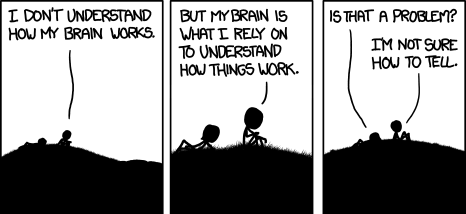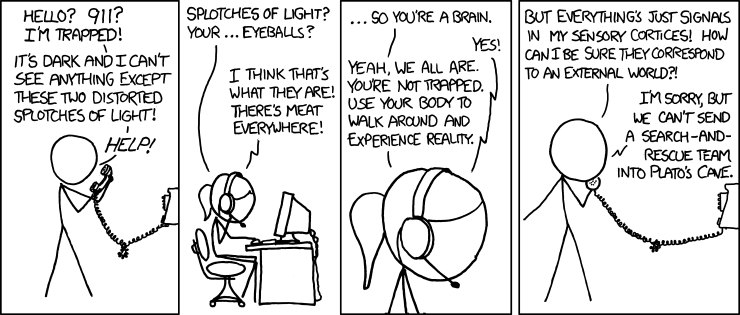I'm opening this as an alternative to the futile religion threads if you want to discuss something off topic. This is about free will. Do we have it? If you answer yes, please explain where it comes from. (please keep religious explanations in the religion threads) If you answer no, what are the consequences for society? Should some law(s) be changed?
+2 / -0
|
|
|
quote:
yes. Because the universe is non-deterministic. |
How do you go from non-deterministic to "under your control"?
+1 / -0
|
If the universe was deterministic, then there would be a fixed path from the big bang to the great smeared mass of heat-death-of-the-universe, a great Random Seed that, if knowable, could predict every possible event and every human decision. The universe is random at a subatomic level, so there is no fixed path. Including the goo in our heads. And I'm not religious. So there's no other place for the decisions to come from but the goo in our heads. Our link to the past is soft and squishy. Our link to anything outside is non-existent. There's just us and now and our decisions.
+0 / -0
|
quote:
there's no other place for the decisions to come from but the goo in our heads |
As I'm not religious either, I have no reason to believe that the decision would come from elsewhere. Yet, the question of free will is not simply about where (spatially) your decision come from. It is about choice, and the "force" providing that ability to choose. I was asking about the link between a non-deterministic universe and your ability to have control over it. In that case, your ability to have control over the part of the universe that is in your brain goo as you say.
+0 / -0
|
I found this article (I think I got this link in #zk, was it you   [V]sheep [V]sheep?) rather persuasive. The short version: Turing’s halting problem (there is no general way of knowing how an algorithm will finish, other than to run it) says there is free will.
+0 / -0
|
Hi   [V]sheep [V]sheep, I want to express my opinion on the original premise. I think there is no free-will. If free-will meant that we could make decision completely unrelated to what is happening to us and to our mind, then there is NO free-will. Every action have reason, and every reason have past reason, so it is impossible to have free-will. Things don't suddenly happen. When we talk about criminal and the law, IMO it change nothing. We always know that stuff happen because of a reason and there's always someone responsible for criminal action (either upstream-source person or unintentionally/side-effect of society). So, IMO it doesn't change anything. I believe people acknowledge the existent of free-will because the phenomenon is apparent to our own perception (we could introspect our mind and test it). Free-will also make sense because the future doesn't really exist yet, so who knows what going to happen and whether it happen the way we choose it to be, instead it will happen the way it wanted to happen irregardless of us. If free-will meant action & effect have no reason and causes, then being unable to effect an outcome is similar to the universe having a free-will (choice doesn't matter), thus proving that free-will exist. :P
+1 / -0
|
@KingRaptor Yes it was me :) And yes it is persuasive... but it does not try to answer whether we have free will or not. It is about whether we (or another device) think we have free will or not.
+0 / -0
|
poor   [V]sheep [V]sheep i tortured him with my thread, feel bad about it, mah clan mate:D
+0 / -0
|
|
|
Don't free willy, hes a murderer:D.
+0 / -0
|
I disagree with that idea that whether the universe is deterministic or non-deterministic can be useful in deciding whether we have free will. Neurons seem to behave basically like any other biological thing. They will of course use non-classical physics (as far as anything else does) but at a low level, the idea that a significant number can maintain coherence is far fetched to me. How would you actually use this non-deterministic universe to have free will? I don't even know if we can determine whether the universe is deterministic or not. Surely we would have to sit outside the universe and watch it to know this. I think the question of free will depends on which scale you look at. If you look at individual neurons then they behave deterministically (or at least uncontrollably) and if you look at the entire universe at this scale then it looks like we don't have free will. But "you" do not exist at this scale either. To get what we think of as a person we need to look at a larger scale system. Sure, you can describe the system entirely in terms of neurons but then you would miss out of the complex higher level behaviour. People are a large scale thing created by the action of neurons (among other things). We can talk about people without referencing the underlying mechanics of how they work. In some sense people don't exist because they are "just" a bunch of correlated atoms. But I think most of us agree that we do exist and I think free will exists in the same sense. I would say that free will exists in the sense than "I" exist. I am some sort of algorithm which takes in inputs, processes them somehow and spits out outputs. The processing is "I" and it clearly determines the outputs so it in a sense has free control of the outputs. This algorithm happens to be implemented on a bunch of neutrons. In principal it may be possible to predict exactly what these neurons do but I think that is unimportant. In short I have redefined free will and said that we have it. Welcome to philosophy.
+3 / -0
|
Und dann: alien hand syndrome. Anyway, i feel like the "free will" thing is a non-entity just as much as soul is, unless you can make predictions based on the answer. Can you? Thought so.
+0 / -0
|
*Added desync to Spring to create free-will* because you don't need to see what others see...
+0 / -0
|
Yeah, as has been said determinism is irrelevant to free will, though a lot of people get hung up on this due to the notion of divine determinism, which is a very different thing. In every way, we ARE the neurons, the sub atomical particles, the genes and alleles, the life experiences. That IS 'us', so to say that those things control us is not to undermine free will. Behaving in a way contrary to our knowledge, emotions and experience (all predetermined in some way) would make our decisions irrational. I mean think about it, if some entity which existed beyond our memory and experience were making all our decisions what would that even look like? If the decisions were based on the input it receives then it too is deterministic. If they are not based on the input it receive even in a small way then what is it based on? Random chance and probability distributions like purported 'quantum free will'? A roulette wheel has no free will, nor do dice. So free will in so far as it exists actually depends on a degree of determinism, if the decisions we make are going to have anything to do with the outside world and our experience of it.
+2 / -0
|
The said algorithm that constitutes the "I" is fixed at any point in time though. So the "free control of output" will always be the same result with the same initial variables, which in part is all your previous experience and the chemistry makeup of the brain.
+0 / -0
|
Well, if we had "free will" in that sense, there would be something (like a soul) that is able to influence the way the neurons in our brain behave, it would need to have some sort of physical influence. It would either have to alter probability distributions or straight up violate known physical laws. So we have a testable theory: If free will exists, physical anomalies should be present in our brains (but not elsewhere). Gogo science! Also, i never got why people are like "well if there's no free will, then the murderer is not guilty because he couldn't choose". That's absolutely a fallacy, by punishing murder you definitely have an impact on the "unfree wills" of other people (and the murderer itself). I mean, if you want to see it in the "i didn't do it, my brain did it" way, then it's just your brain that receives punishment, not you... Obligatory xkcd:  And: 
+6 / -0
|
Love this thread, +1 to sheep I don't believe in free will as IMO we are just complex machines conditioned by our environment. If we had free will, then I wonder: would the other animals have free will too? If not, where would be the "barrier" between the minds with "free will" and the ones without it be? This would be in my opinion a tricky question and there are a lot more if you think about it So just keep it simple, not having free will has more sense to me Regarding the deterministic thing For some reason I can't imagine a non deterministic universe, since I am used to the action-reaction scheme... Physicists say that in the quantum world things are random but i can't understand that. As far as I know, they say that you can't know the velocity of an electron and at the same time its position (or something like that) because you modify it in the process of obtaining information. Am I wrong?. But that doesn't imply that the universe is non deterministic, does it? Anyway I guess I agree with google, there is no way to know that unless you watch from outside the universe. Thinking of the universe as a program is a good analogy.
+1 / -0
|
quote:
poor [V]sheep i tortured him with my thread, feel bad about it, mah clan mate:D |
I am learning nothing in your thread and you are not learning anything either. I'm just trying to siphon brains off your thread to discuss this "free will" topic, which IMO is more interesting :) And so far, I love the answers in this thread... they are interesting, whether I agree or not with them!
+0 / -0
|
quote:
Physicists say that in the quantum world things are random but i can't understand that. As far as I know, they say that you can't know the velocity of an electron and at the same time its position (or something like that) because you modify it in the process of obtaining information. Am I wrong?. But that doesn't imply that the universe is non deterministic, does it? |
Yes, Heisenberg's uncertainity principle just states that you cannot both know position and velocity (it's a bit more general than that). The common explanation is that you'll have to modify one to obtain the other, however it's rather about information in general. The conclusion is just that it is impossible to accurately predict the universe, even if we knew all the mechanics behind it, due to the fact that we have no reliable information on any initial state. This doesn't decide over whether or not the universe is deterministic, it could very well be a really complex automate (see xkcd 505) and be deterministic.
+3 / -0
|


